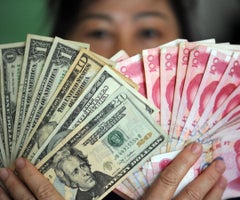MI SELECCIÓN DE NOTICIAS
Noticias personalizadas, de acuerdo a sus temas de interés

By Mike Bird
The yuan just hit its weakest point against the dollar in a decade. That puts it and the country’s hybrid financial system-where the state and the market both play big roles-back in the spotlight.
The Yuan Moves-in a Controlled Way
Most major currencies like the U.S. dollar, euro and Japanese yen are free floating, meaning markets set their exchange rates minute by minute. Others, like the Hong Kong dollar, are pegged closely in value to another currency.
Mainland China used a system like Hong Kong’s until 2005, but today the yuan is somewhere in between. Authorities fix a daily midpoint-based partly on the previous close-and let the yuan trade as much as 2 percentage points above or below this level, intervening to buy and sell the yuan if it rises or falls too far. That caps daily volatility.
…And It Trades in Two Markets
The onshore market is under the government’s direct jurisdiction, while the offshore market has no trading band. The offshore yuan is traded mostly in Hong Kong and is also known as CNH. It often reflects where investors believe the onshore yuan, or CNY, will end up.
Borrowing costs differ. When the People’s Bank of China, the central bank, wants to support the yuan without affecting the domestic economy too much, it can raise interest rates offshore, as analysts believe it has done this year. That makes it costlier to bet against the currency.
China Has a Huge War Chest
China owns around $3 trillion in foreign-exchange reserves, a key tool for currency management. If the yuan is too weak, it can sell U.S. Treasurys or other assets and use the received dollars to buy the Chinese currency, supporting its value. From mid-2014 to early 2017, those reserves fell by nearly $1 trillion as the PBOC tried to stabilize its currency and as Chinese investors moved money overseas.
China’s major state-owned banks can also help out. This year, they have bought swaps-a way to bolster the currency without immediately depleting reserves. The purchases of those swaps drive up the implied future value of the yuan in forward markets. For speculators who want to short the currency-betting on its decline by selling borrowed yuan now and buying it back more cheaply in the future-this makes those trades look more expensive.
The Yuan Has Yet to Go Truly Global
Despite China’s economic heft, its currency makes up just around 1% of cross-border transactions, according to payments firm Swift. That isn’t surprising, given that China maintains strict controls on the movement of money in and out of the country.
Still, Beijing has made tentative efforts to internationalize the yuan. In 2016, it joined the International Monetary Fund’s basket of reserve currencies, a milestone in the country’s financial development.
The PBOC nowadays tracks the yuan’s value against various counterparts, which has reduced the role of the dollar in determining its value. But the relationship with the dollar remains crucial, due to the its central role in global trade, in addition to charges by President Trump that China’s government is artificially holding its currency down for economic advantage.
The Central Bank Has a Different Set of Tools
Many central banks rely heavily on benchmark interest rates, which in turn directly affect currencies, since higher rates draw in capital.
But China’s monetary policy also looks different: its central bank focuses more on so-called reserve-requirement ratios, a tool rarely deployed elsewhere, which determines how much a bank must hold in reserve at the PBOC relative to its deposits. Higher rates mean less lending. The central bank, which isn’t an independent entity like the Federal Reserve, has done this in part because this ratio is less politically sensitive than moving interest rates.
This setup also means Beijing can attempt to stimulate the economy without pressuring the yuan as much as a traditional interest-rate cut would.
A pensiones de viudedad se han destinado US$2.593 millones, mientras que la nómina de las prestaciones por incapacidad permanente asciende a US$1.504 millones
La Casa Blanca no proporcionó información sobre dichas conversaciones ni ha comentado sobre una posible reunión con el presidente ucraniano
Según reportes preliminares del incidente natural, se dijo que las zonas más afectadas por este fuerte temblor fueron los territorios de La Libertad y Áncash, en el norte del país